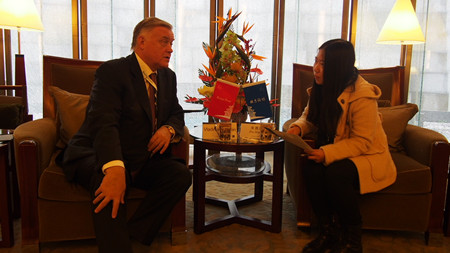Peking University, Nov. 26, 2015: Vladimir Yakunin is founding president of the World Public Forum “Dialogue of Civilizations”, a Doctor of Political Sciences and Head of the Department of State Politics at Lomonosov Moscow State University. As a keynote speaker at the 2015 Beijing Forum, he shared his personal experience and his ideas about civilization interactions.
As a popular advocate of diversity of civilizations, Professor Yakunin himself also lives a life of diversity. He graduated from the Leningard Institute of Mechanics as a mechanical engineer in 1972, and was employed as a professional in the State Institute of Applied Chemistry. He described himself as “an active, young professional” at the time.
However, he was inspired by and interested in politics after returning from a United Nations program, in which he served in the technical subcommittee responsible for the peaceful usage of outer space.Later, as Deputy Minister of Transport, he continued his scientific research as well as his study in political sciences, and obtained his doctorate degree in Political Science. Though mainly devoted to the World Public Forum in recent years, he has never given up his academic research and his identity as a technical expert.
According to Professor Yakunin, when he first encountered Professor Huntington’s theory, Clash of Civilizations, he felt it so strange and difficult to accept such an idea. This led to the establishment of the World Public Forum “Dialogue of Civilizations”. Professor Yakunin refers to it as his “reaction as an educated person acknowledging the importance of the peaceful development of civilization interaction”.
Through the forum, Professor Yakunin hopes to make people understand that the diversity of civilizations is what creates beauty in the world. Since civilizations differ in history, tradition, resources and so on, it is not possible for them to live in the same way. Thus, one civilization should never impose its values on the others. However big or small the civilizations are, they are equal in terms of the fate of the earth, and should interact on the basis of mutual understanding and respect. With these goals, the forum, two years older than the Beijing Forum, has been developing well and has been widely accepted, assembling other concerned citizens to promote the harmony of civilizations.
About the Beijing Forum, Professor Yakunin believes it is the embodiment of China’s right choice in this new era of China’s increasing significance in the world stage of both economy and politics. The formerly isolated and self-sufficient country is now embracing the world and undertaking responsibilities in global issues. He also points out that the Beijing Forum has a bigger focus on academic discussions and solutions, whereas the World Public Forum mainly focuses on practical issues.
Professor Yakunin was invited to deliver a speech in Peking University on the eve of the opening ceremony, which he described as an interesting experience because ‘the speaker is not using [his or her] mother tongue and the student not receiving information in their native language’. He also commented that he thinks highly of students of Peking University, impressed by the quality of their questions and their capacity in handling both practical and philosophical issues.
“The politicians of older generations sometimes are losing ground by thinking they are in possession of the world. It is fake, because we all have limited time on the earth.” Professor Yakunin clearly recognizes the importance of the younger generation in promoting the harmony between civilizations. Therefore, he appeals to the younger generation to be more involved in practical, strategic situations of the future, and to participate more actively in civil life and in global issues.
Professor Yakunin has now been invited to be a visiting professor of Peking University. According to him, there will be more cooperation between the Beijing Forum and the World Public Forum as well as between Peking University and Russian universities, such as mutual think tanks, student and faculty exchange programs as well as collaboration with the Song Qingling Foundation of Peking University. He hopes that, hand in hand, China and Russia can continue to contribute to the harmony of civilizations.

Reported by: Jin Panzhu
Edited by: Candice Liao Shunyi
